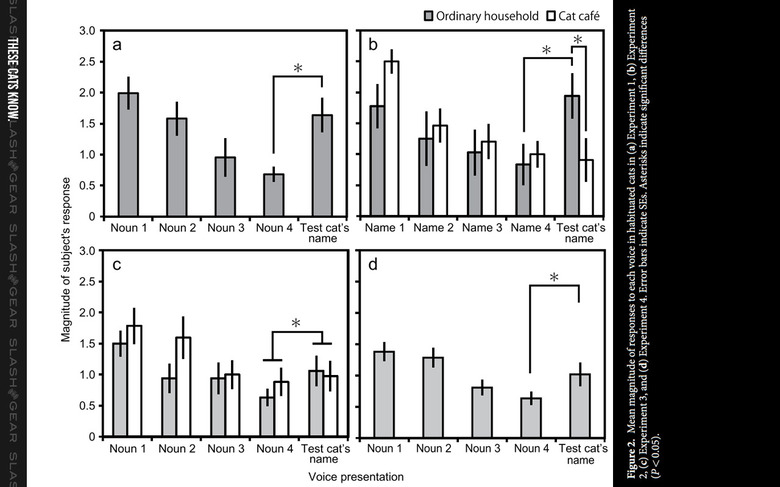Your Cat Recognizes Its Name, Even If They Ignore Your Call
This is the cat-related story we need right now – research on whether cats cannot recognize their own name, or recognize their name and just don't care that you've been calling. A paper was published on research of this question – does my cat understand that I'm calling her name? To figure this question out, researchers worked with cats in "ordinary households" as well as cats in the most wonderful establishment on earth – the cat cafe.
Over the course of a few years, researchers published two papers with the data they'd found in this cat-tracking experiment. One paper went by the name of "Vocal recognition of owners by domestic cats (Felis catus)." The other was called "Domestic cats (Felis catus) discriminate their names from other words."
Per the first part of the research, cats most often responded to human voices not by communicative behavior (vocalization and tail movement), but by orienting behavior (ear movement and head movement).

Tests had cats called several times by their owners, then by strangers, then by their owners again. These tested cats showed significant responses to their names as called by their owners, slightly muted response to strangers calling their name, then a "rebound" of response when their names were called once more by their owners.
In the second part of the experiment, tests included several nouns. These nouns in some cases were words that sounded like a test subject cat's name. In other cases, testers used names of other cats that lived in the same space as the test subject cat.
Tests indicated the that "cats can discriminate human utterances based on phonemic differences." The study went on to note that "such discrimination is acquired without explicit discrimination training," and instead emerges "from the patterns of natural daily communication between humans and cats."
While the possibility of such is likely fairly obvious to many cat owners, here it's begun to be part of scientific study for the first time. Extensive testing has been done in the past on similar subjects for dogs, now it's time for cat studies aplenty. No longer will your cat be able to escape the truth: They know their name, they're just playing dumb!
Dr Atsuko Saito* and Kazutaka Shinozuka participated in the first and second studies. *Dr. A. Saito works with the Department of Cognitive and Behavioral Science, Graduate School of Arts and Sciences, the University of Tokyo. Also the Department of Childhood Education, Musashino University, and the Department of Psychology, Faculty of Human Sciences, Sophia University. Saito also captured the photo of the cat you see above. Shinozuka worked with the RIKEN Center for Brain Science.
The first paper referenced above was published all the way back in 2013, and you can find that authored by Atsuko Saito and Kazutaka Shinozuka. The title of this paper is "Vocal recognition of owners by domestic cats (Felis catus)", as published with code doi: 10.1007/s10071-013-0620-4, Animal Cognition Online Edition: 2013/3/25.
The second part of this research was published in part in April of 2019, then amended in October of 2019. You can tap into this with a PubMed link to code DOI: 10.1038/s41598-019-46257-x, and the paper's name (again) is "Domestic cats (Felis catus) discriminate their names from other words"
FUN FACT: Shinozuka also participated in another study with cats on their musical preferences. Commenting on a study published at around the same time on the same subject, Shinozuka suggested that cats generally prefer "classical pieces."
